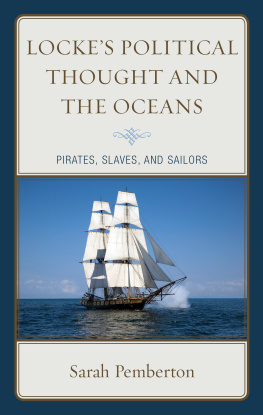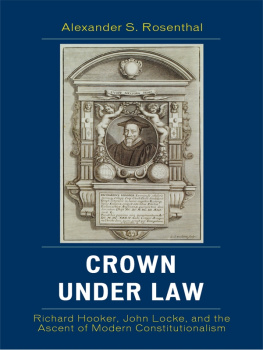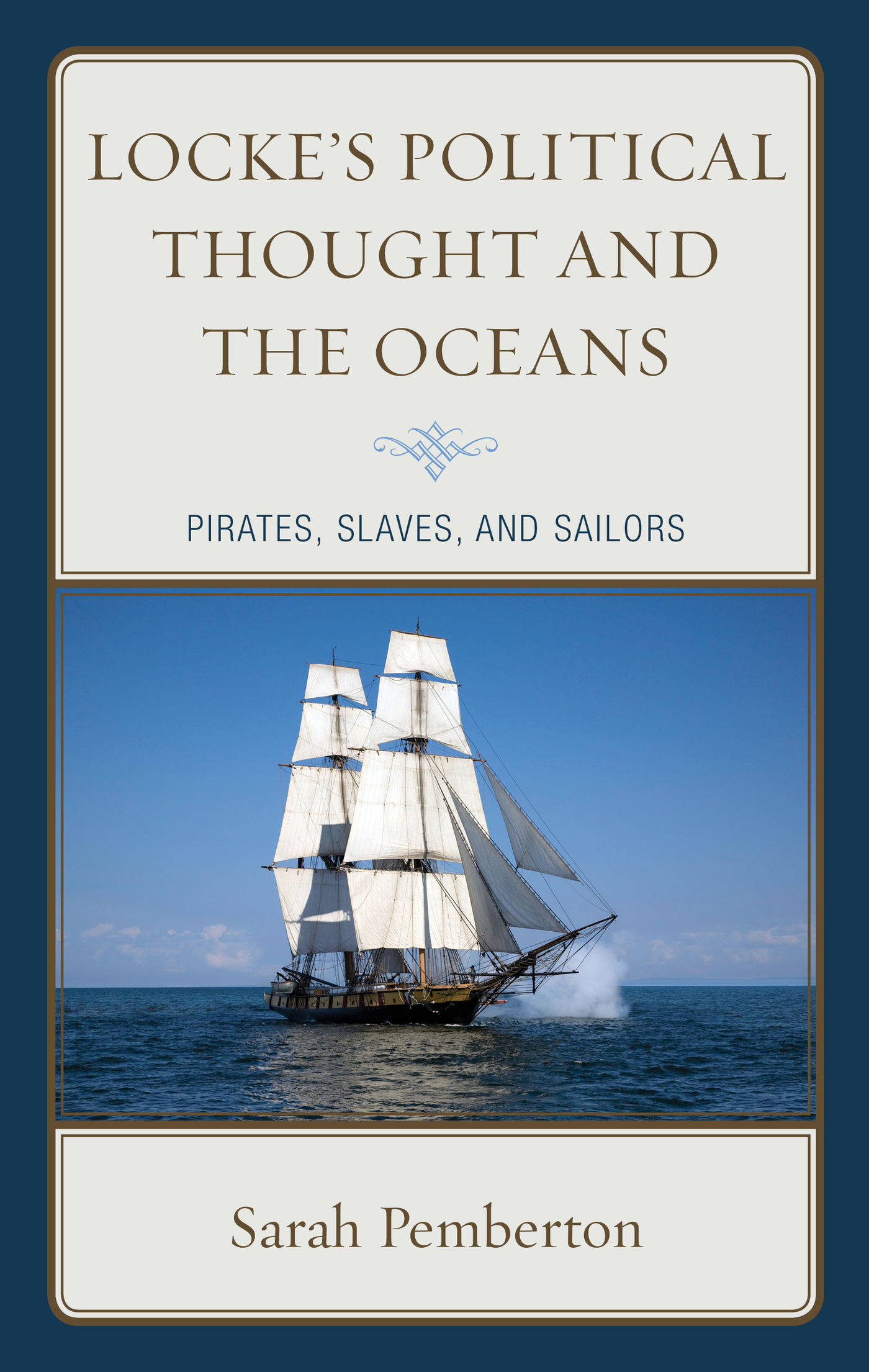Lockes Political Thought
and the Oceans
Lockes Political Thought
and the Oceans
Pirates, Slaves, and Sailors
Sarah Pemberton
LEXINGTON BOOKS
Lanham Boulder New York London
Published by Lexington Books
An imprint of The Rowman & Littlefield Publishing Group, Inc.
4501 Forbes Boulevard, Suite 200, Lanham, Maryland 20706
www.rowman.com
Unit A, Whitacre Mews, 26-34 Stannary Street, London SE11 4AB
Copyright 2017 by Lexington Books
All rights reserved. No part of this book may be reproduced in any form or by any electronic or mechanical means, including information storage and retrieval systems, without written permission from the publisher, except by a reviewer who may quote passages in a review.
British Library Cataloguing in Publication Information Available
Library of Congress Cataloging-in-Publication Data Available
ISBN 978-1-4985-3821-3 (cloth : alk. paper)
ISBN 978-1-4985-3822-0 (electronic)
 TM The paper used in this publication meets the minimum requirements of American National Standard for Information Sciences Permanence of Paper for Printed Library Materials, ANSI/NISO Z39.48-1992.
TM The paper used in this publication meets the minimum requirements of American National Standard for Information Sciences Permanence of Paper for Printed Library Materials, ANSI/NISO Z39.48-1992.
Printed in the United States of America
Acknowledgments
This project began as a conference paper in 2012 and grew inexorably into a book. Throughout the process I have received the encouragement and help of many colleagues, friends, and family members, and I am deeply grateful to them all.
This book would not have been possible without the support and fund
ing provided by Ohio University and the University of South Florida. I have
been lucky to work with colleagues who were generous with their time and
their insights. In the course of this project many of my colleagues provided
invaluable advice and comments, and my thanks go especially to Mark
Amen, Susan Burgess, Darcie Fontaine, Judith Grant, Cheryl Hall, Brandon
Kendhammer, Sarah Poggione, Manu Samnotra, Scott Solomon, Kathleen
Sullivan, Steven Tauber, Debra Thompson, Stephen Turner, Myra
Waterbury, and Julie White. The archival research involved in this book was enabled by grants from the University of South Florida and by research leave during autumn 2014, which made it possible for me to accept a Visiting Fellowship at the Centre for the Study of the History of Political Thought at Queen Mary University of London. I am grateful to the Centres members Georgios Varouxakis and Quentin Skinner for the encouragement and counsel that they provided.
During the past four years I have presented draft versions of several chapters at a number of conferences and meetings, and this book benefited greatly from the questions, suggestions, and provocations that I received. I am very grateful to the following scholars for the feedback that they provided: Clare Anderson, Lorna Bracewell, Alec Dinnin, Vicki Hsueh, Jane Anna Gordon, Jennie Jeppesen, Hamish Maxwell-Stewart, Anita Rupprecht, and Thomas Smith. My thanks also go to Jonathan Havercroft, Tracy Strong, and the other members of the University of Southampton Department of Politics and International Relations for inviting me to present to their department seminar and for providing rich and insightful comments. I also benefited from discussing this project with attendees at the Seminar in the History of Political Ideas organized by the Institute for Historical Research at the University of London.
This project owes particular debts to two exceptional Locke scholars: Barbara Arneil and David Armitage. As my PhD supervisor at the University of British Columbia, Barbara provided unfailing support, encouragement, and advice. Although this project began after my PhD, it was nonetheless shaped by Barbaras wonderful teaching and research. Early in this project David Armitage played an equally vital role by generously sharing his copy and transcription of Pyracy 97, and his scans of Lockes colonial papers.
It was a pleasure to work with Joseph Parry at Lexington Books, and I am grateful for his support and wisdom in guiding me through the publication process. I also received valuable commentary on my draft manuscript from three anonymous reviewers who provided wide-ranging, incisive, and detailed comments. I learned much from their different and complementary perspectives, and this book is much stronger as a result. All remaining errors are, of course, my own.
I dedicate this book to my family. My partner, Greg, provided encouragement and comments at every stage in the process. The ultimate inspiration for the book came from my mum, who hails from a family of sailors and is as fierce as any pirate. She insisted that I learned to sail and ensured that there was a safe harbor to which I could return.
Introducing Lockes
Maritime Political Thought
In September 1695 a gang of English pirates pulled off one of the biggest heists in history when they ambushed an Indian pilgrim fleet traveling from Surat to Mocha. The pirates captured two ships and stole treasure worth over 150,000, Each
pirate received over a thousand pounds in proceeds, The following year John Locke was appointed to Englands new Board of Trade, and the Board began working to tackle the problem of piracy. Locke himself proposed a new English piracy law and a multilateral piracy treaty, supported the deployment of English naval ships to fight pirates, and advocated the removal of colonial governors who failed to arrest pirates. The Boards work led to a new piracy law in 1700 that expanded the definition of piracy, introduced more severe penalties, and authorized the English navy to capture and try pirates anywhere on the worlds seas. The Board also proposed political reforms to suppress piracy in English colonies, and these reforms gave the English Crown and Parliament more centralized control over the American colonies. Taken collectively, the Boards work on piracy contributed to the development of the eighteenth-century British empire on land and at sea.
Piracy was only one of many issues tackled by the Board of Trade during Lockes tenure, but it helps to illustrate both Lockes contribution to English policymaking and the relationship between his political theory and his work on the Board. This book examines Lockes political thought about the oceans by considering his arguments in the Two Treatises, Lockes other political writings including unpublished essays and letters, and his activity on the Board of Trade. The Board worked on a huge range of economic and colonial issues that often have no direct bearing on Lockes political thought, so I will not attempt to summarize all Lockes activity on the Board. Instead, I provide a close examination of Lockes Board of Trade work on three issues that are related both to the maritime world and to important aspects of his political theory: piracy, forced naval service (also known as naval impressment), and the transportation of English convicts to the colonies for sale into forced labor. The piracy policies that Locke proposed to the Board are based on his empirical understanding of piracy and his underlying views about crime, punishment, and the legal status of the oceans, which are part of his normative political theory. Lockes work on convict transportation as a member of the Board was influenced both by his practical understanding of English colonialism and migration, and by his theoretical views about natural rights, slavery, and forced labor. Similarly, the issue of forced naval service is related both to Lockes theoretical arguments about military service in the
Next page











 TM The paper used in this publication meets the minimum requirements of American National Standard for Information Sciences Permanence of Paper for Printed Library Materials, ANSI/NISO Z39.48-1992.
TM The paper used in this publication meets the minimum requirements of American National Standard for Information Sciences Permanence of Paper for Printed Library Materials, ANSI/NISO Z39.48-1992.